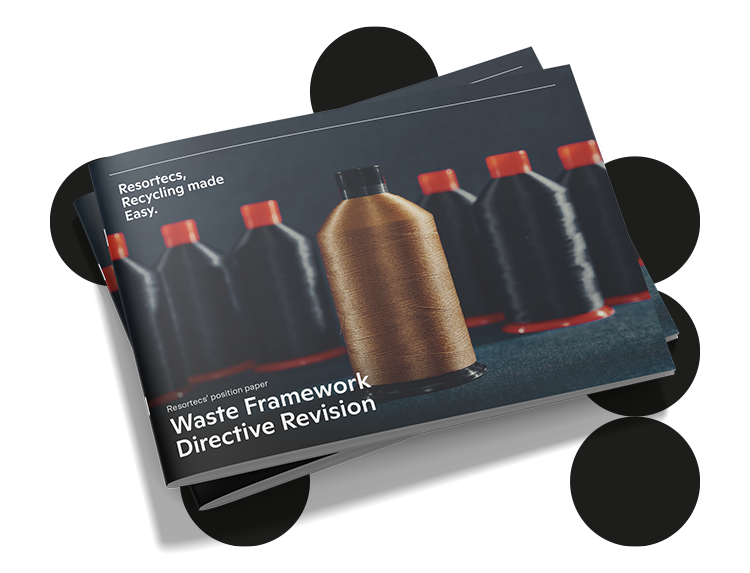Resortecs’ position on the Waste Framework Directive revision

Resortecs policy asks Waste Framework Directive revision
1. Swift introduction of mandatory and harmonised Extended Producer Responsibility (EPR) schemes for textile products across the EU to introduce their separate collection.
2. Extended Producer Responsibility fees should be eco-modulated to incentivise producers to ecodesign their products. Design for disassembly must be included as a criterion.
3. Include a 2030 target for textiles-textiles recycling target as well as a fibre-to-fibre sub-target (for when the former is no longer an option to avoid premature downcycling). These targets should increase over time.
4. To deliver the waste hierarchy principles in practice, recognition and support of so-called pre-recycling techniques that are preconditions to effective circularity operations, such as sorting and disassembly, should be developed and integrated into the modernised Waste Framework Directive.
____________________________________________________________________
Action to make circular economy the norm is urgent. The Circularity Gap Report 2023 demonstrates that the world’s circularity has declined from 9.1% to 7.2% over the past five years, whilst total material extraction has almost doubled since 2000, reaching 100 billion tonnes today. As recognised by the EU Green Deal, the Circular Economy Action Plan, the EU Industrial Strategy, and the Textiles Ecosystem Transition Pathway, the textiles sector is key to the green transition as it is the fourth most resource intense industry, it accounts for 10% of global greenhouse gas emissions, and less than 1% of all textiles waste collected enters into a circular loop.
Resortecs supports the European Commission’s 2030 vision for a competitive, resilient, and innovative textiles sector laid out in the EU Strategy for Sustainable and Circular Textiles, particularly that all textile products placed on the EU market are eco-designed, sustainable and with producers taking responsibility for their products along the value chain with sufficient capacities for recycling and ending incineration and landfilling.
To achieve this ambitious vision, Europe must unlock industrial-scale circularity for textiles. Design for disassembly is key to unleash the full potential of textile-to-textile reuse, repair, and recycling. Even with an ideal circularity infrastructure, most textile products on the market would remain too complex or expensive to repair or recycle once they become waste because they are not designed for disassembly and, therefore, circularity. Once collected, most cannot be processed without a pre-recycling step such as disassembly. This is a key end-of-life-problem for the industry. For example, over 78% of all textile products are multi-material and the presence of zippers and trims like elastic bands hinder recycling. This results in material loss as most textile waste goes to incineration or landfill, and most new textiles products manufactured from scratch.
Disassembly is still a manual and costly process. To address this, Resortecs’ active disassembly innovations – a range of heat-dissolvable threads (‘Smart Stitch™’) and thermal disassembly system (‘Smart Disassembly™’) – helps to replace textiles designed for waste with textiles eco-designed for disassembly, thereby enabling material recovery for reuse, repair, upcycling, and high-quality recycling as well as waste prevention. Active Disassembly represents the pinnacle of Design for Disassembly methodologies (other pre-recycling available today include mechanical disassembly and manual disassembly). By incorporating releasable fasteners in a product’s design and assembly – such as Resortecs’ SmartStitch™ – active disassembly delivers an automatic, non-destructive, and economic industrial disassembly process that segregates components and materials of a product at its end-of-life.
A major benefit of Resortecs is that it acts as a drop-in solution to the textiles value chain as no significant infrastructure or manufacturing changes are needed in the value-chain for implementation of this technology. It also delivers circularity without compromising the creativity, design, and quality of clothing.
Click here or on the image below to download the full position paper.

Discover how Resortecs closes the loop stitch by stitch.
Please Fill the fields, we will contact you
as soon as possible.
OTHER ARTICLES
Join us.
Subscribe to our newsletter.
By subscribing, I agree with having my personal data stored and processed by Resortecs so I can receive future updates and marketing offers.




